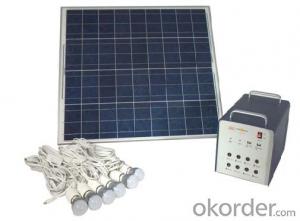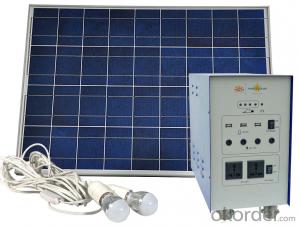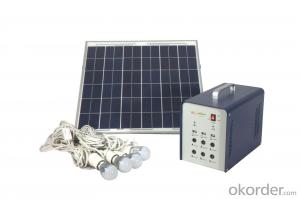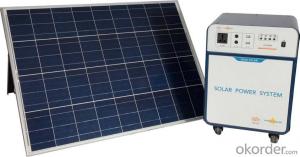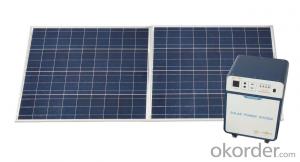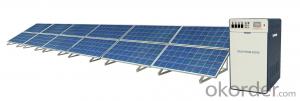Solar Energy Systems Brampton Home Off-Grid Solar Power System DC Lighting JS-SPS-300C
- Loading Port:
- Tianjin
- Payment Terms:
- TT OR LC
- Min Order Qty:
- 10 set
- Supply Capability:
- 10000 set/month
OKorder Service Pledge
Quality Product, Order Online Tracking, Timely Delivery
OKorder Financial Service
Credit Rating, Credit Services, Credit Purchasing
You Might Also Like
Off-grid Solar Power System
General Introduction
Solar power system provides alternating current and direct current, which is produced by the modules transforming solar power into power, to home lighting, household appliance and other DC appliance, such as cell phone and laptop.
Solar power system is widely used in area lack of power, for example house power supplying, monitoring, communication base, fire prevention in forest area, pasture and meadow, aquaculture etc.
We are dedicated to provide high quality off-grid PV products and systems to customers and has received a series of certificate, including ISO9001, TUV, UL, CE, CQC and RoHS.
Solar DC Lighting System
Multiple protection system, safe and reliable performance.
Integrated and portable design, easy operation.
DC5V, DC12V, AC220V output, wide range application.
Clean engergy, cycle use.
General Introduction
Solar power system provides alternating current and direct current, which is produced by the modules transforming solar power into power, to home lighting, household appliance and other DC appliance, such as cell phone and laptop.
Solar power system is widely used in area lack of power, for example house power supplying, monitoring, communication base, fire prevention in forest area, pasture and meadow, aquaculture etc.
We are dedicated to provide high quality off-grid PV products and systems to customers and has received a series of certificate, including ISO9001, TUV, UL, CE, CQC and RoHS.
Solar DC Lighting System
Multiple protection system, safe and reliable performance.
Integrated and portable design, easy operation.
DC5V, DC12V, AC220V output, wide range application.
Clean engergy, cycle use.
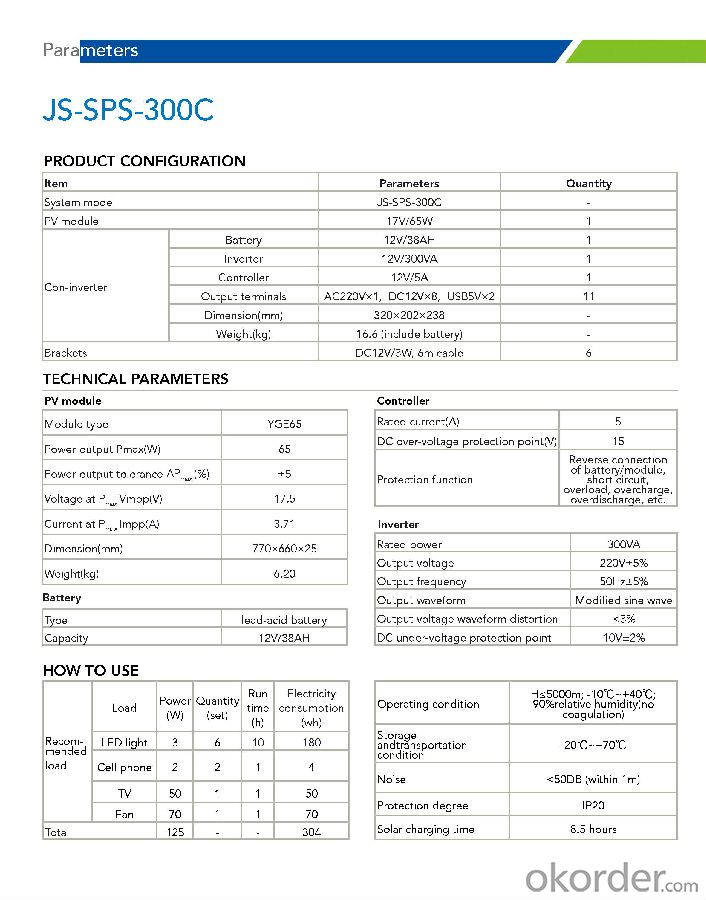
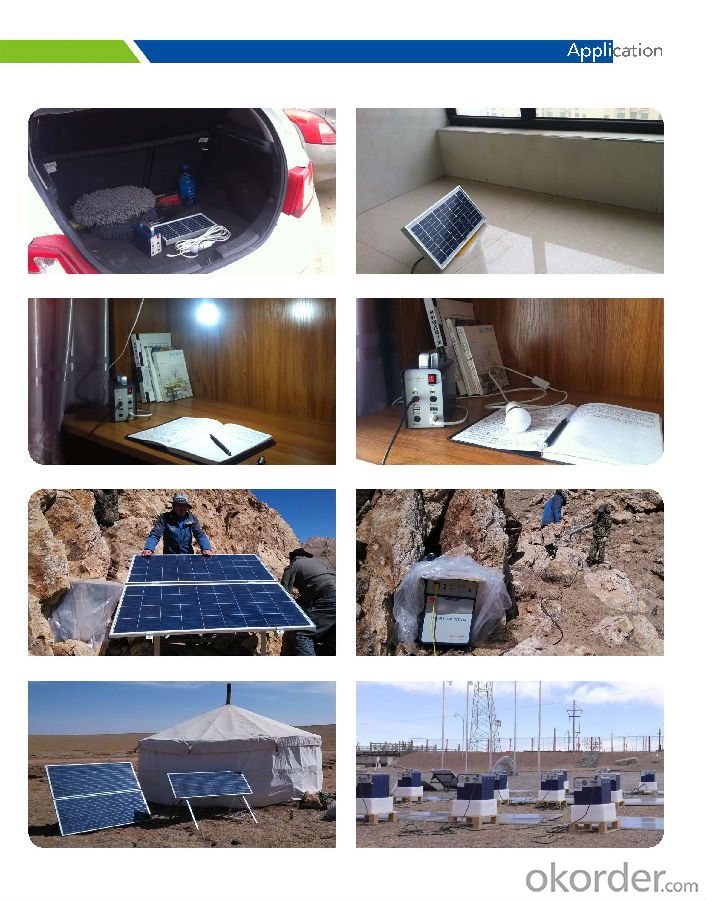

- Q: What is the impact of solar energy systems on reducing energy poverty?
- The provision of affordable and sustainable electricity to communities lacking reliable access to traditional power grids is significantly impacted by solar energy systems. One of the primary benefits of such systems is their ability to generate electricity from sunlight, which is abundant in many parts of the world. This allows for the installation of solar energy systems even in remote and underserved areas, thereby reducing dependence on expensive and polluting fossil fuels. Solar energy systems harness the power of the sun to bring electricity to rural households, schools, and healthcare facilities that previously relied on costly and unreliable alternatives like kerosene lamps or diesel generators. This not only improves the quality of life for individuals and communities but also facilitates economic development by granting access to modern technologies and opportunities. Additionally, solar energy systems contribute to the reduction of energy poverty through the provision of a stable and dependable energy source. Due to their minimal maintenance requirements and long lifespan, solar panels can continue generating electricity for many years, minimizing the risk of power outages and ensuring a consistent energy supply. Furthermore, solar energy systems empower communities by enabling them to become energy-independent and self-sufficient. By installing solar panels on rooftops or utilizing solar-powered mini-grids, communities can generate their own electricity and decrease reliance on centralized energy systems. This not only enhances energy security but also creates income-generating opportunities through the sale of excess electricity back to the grid. In conclusion, solar energy systems play a vital role in reducing energy poverty by providing affordable and sustainable electricity to underserved communities. They enhance quality of life, foster economic development, and empower communities to become self-reliant. By leveraging the abundant and renewable energy of the sun, solar energy systems have the potential to transform the lives of millions of people and alleviate energy poverty on a global scale.
- Q: Can solar panels be used in military operations or remote military outposts?
- Yes, solar panels can be used in military operations or remote military outposts. They provide a reliable and sustainable source of energy, reducing dependence on fuel supply lines and minimizing the environmental impact. Solar panels can be easily integrated into various military systems, providing power for communication equipment, surveillance systems, and other essential devices. Additionally, their portability and ability to operate in remote locations make them a practical solution for military operations and outposts where access to traditional power sources may be limited.
- Q: How do solar energy systems impact the electricity grid?
- Solar energy systems can have a positive impact on the electricity grid by reducing the demand for traditional fossil fuel-based electricity generation. As more solar power is generated and fed into the grid, it helps to diversify the energy mix and decrease the reliance on non-renewable sources. Additionally, solar energy systems can help alleviate peak demand periods, especially during sunny days, leading to a more stable and reliable grid. However, the intermittent nature of solar power can also pose challenges for grid operators in terms of managing fluctuations and ensuring grid stability.
- Q: Can solar energy systems be used for powering electric train systems?
- Electric train systems can be powered using solar energy systems. Photovoltaic (PV) panels or concentrated solar power (CSP) systems can convert solar energy into electricity, eliminating the need for fossil fuel engines. The feasibility of solar energy for trains depends on factors like sunlight availability, panel size and efficiency, and energy requirements. For example, regions with abundant sunlight, like deserts, can effectively harness solar energy for trains. Solar-powered train systems already exist globally. The Byron Bay Train in Australia relies solely on a solar train system with panels and battery storage. In India, a railway line section is powered by solar energy, providing sustainable transportation. Implementing solar energy systems for electric trains brings numerous benefits. It reduces dependence on fossil fuels, lowering greenhouse gas emissions and combating climate change. Solar energy is renewable, offering a sustainable long-term solution. Additionally, solar-powered trains have lower operating costs due to reduced maintenance and stable fuel prices. However, challenges exist with solar energy for train systems. Initial installation costs can be high, but long-term savings outweigh the investment. Sunlight intermittency is also a challenge, especially during cloudy or nighttime conditions. This can be resolved using battery storage systems that store excess energy for later use. In conclusion, solar energy systems are viable for powering electric train systems. Advancements in solar technology and the need for sustainable transportation position solar-powered trains as a significant factor in the future of rail transportation, promoting clean energy and reducing environmental impact.
- Q: What permits or approvals are required for installing a solar energy system?
- The permits and approvals required for installing a solar energy system vary depending on the location and local regulations. In general, some common permits and approvals may include building permits, electrical permits, and interconnection agreements with the local utility. Additionally, certain jurisdictions may have specific requirements for setbacks, zoning, and environmental impact assessments. It is crucial to consult with local authorities and professionals to determine the exact permits and approvals needed for a solar energy system installation.
- Q: How does solar energy affect property value?
- There are various ways in which solar energy can positively impact property value. To begin with, homes that are equipped with solar panels are generally viewed as being more eco-friendly and energy-efficient, which appeals to an increasing number of homebuyers who prioritize sustainability. This rise in demand can result in an increase in property values. Moreover, solar panels can considerably reduce or even eliminate electricity bills, making a home more affordable to live in over time. This financial advantage can make a property more appealing to potential buyers and enhance its desirability. Additionally, certain studies have indicated that homes with solar panels sell at a faster rate when compared to those without, implying that solar energy can enhance a property's marketability. All in all, solar energy has the potential to raise property value by decreasing energy costs, attracting environmentally-conscious buyers, and boosting marketability.
- Q: How does the quality of solar panels affect their performance?
- The quality of solar panels directly affects their performance. Higher quality panels tend to have better conversion efficiency, meaning they can convert a higher percentage of sunlight into electricity. They also tend to be more durable and have a longer lifespan, which means they can continue to generate electricity efficiently over a longer period of time. In contrast, lower quality panels may have lower efficiency, degrade faster, and be more prone to failure, resulting in reduced performance and shorter lifespans. Therefore, investing in higher quality solar panels is crucial for maximizing their performance and long-term benefits.
- Q: Can solar energy systems be used in powering research farms or agricultural laboratories?
- Yes, solar energy systems can certainly be used to power research farms or agricultural laboratories. Solar energy is a clean and renewable source of power that can be harnessed through the installation of solar panels. These panels convert sunlight into electricity, which can then be used to power various equipment and facilities. Research farms and agricultural laboratories often require a significant amount of electricity to operate, including lighting, heating, cooling, and powering agricultural machinery. By utilizing solar energy systems, these facilities can reduce their reliance on fossil fuels and decrease their carbon footprint. Solar energy systems can be installed on the roofs of buildings or on open land near the research farm or laboratory. The amount of solar energy generated will depend on factors such as the location of the facility, the size of the solar panels, and the amount of sunlight received. However, with advancements in solar technology, even areas with limited sunlight can still benefit from solar energy systems. In addition to being environmentally friendly, solar energy systems can also provide long-term cost savings for research farms and agricultural laboratories. Once installed, solar panels have a lifespan of 25-30 years, requiring minimal maintenance. This can lead to significant savings on electricity bills, especially in rural areas where grid connectivity may be unreliable or expensive. Furthermore, solar energy systems can provide a reliable source of power, especially during periods of peak demand or power outages. By incorporating battery storage systems, excess energy generated during the day can be stored and used during the night or cloudy days, ensuring a continuous power supply for research activities. Overall, solar energy systems are a viable and sustainable solution for powering research farms and agricultural laboratories. They offer numerous benefits, including reduced environmental impact, long-term cost savings, and reliable power supply. As the demand for renewable energy continues to grow, integrating solar energy systems into agricultural facilities can contribute to a greener and more sustainable future.
- Q: Can solar energy systems be used in powering green hotels or eco-resorts?
- Green hotels and eco-resorts can definitely make use of solar energy systems. Solar power is a clean and renewable energy source that can greatly help these establishments reduce their carbon footprint. Installing solar panels on roofs or open spaces allows them to generate electricity from the sun and use it to power their operations. Solar energy systems can provide a significant amount, if not all, of the electricity needed to run a green hotel or eco-resort. This includes powering lighting systems, heating and cooling systems, water pumps, and other electrical appliances. Any excess energy generated during the day can be stored in batteries or fed back into the grid for use during periods of low sunlight or at night. Incorporating solar power not only reduces reliance on fossil fuels but also increases the self-sufficiency and resilience of these establishments during power outages. It aligns with their commitment to sustainability and attracts environmentally conscious travelers who prioritize staying in eco-friendly accommodations. Moreover, solar energy systems can enhance the overall guest experience at these hotels and resorts. They offer opportunities for educational tours and demonstrations, where guests can learn about the benefits of solar power and the importance of renewable energy sources. This can raise awareness and inspire guests to adopt sustainable practices in their own lives. In conclusion, solar energy systems are an excellent choice for powering green hotels or eco-resorts. They provide a clean, renewable, and dependable source of electricity that aligns with the sustainability goals of these establishments. By harnessing the power of the sun, they can reduce their carbon footprint, improve the guest experience, and contribute to a more sustainable future.
- Q: How do solar energy systems impact the reliability of electricity supply?
- The reliability of electricity supply is greatly improved by solar energy systems. These systems harness the energy of the sun to produce electricity that is clean, renewable, and plentiful. This reduces our dependence on traditional fossil fuel-based power generation, which is vulnerable to price fluctuations and supply disruptions. One of the main benefits of solar energy is its distributed nature. Solar panels can be installed on rooftops or in small-scale setups throughout a community, creating a decentralized model of electricity generation. This approach helps mitigate the risks of large-scale power outages caused by natural disasters, equipment failures, or grid disturbances. In the event of a local blackout or grid failure, solar energy systems can continue to provide electricity to homes, businesses, and critical infrastructure, ensuring a more dependable power supply. Moreover, solar power systems can enhance grid stability and reliability by reducing peak demand on the electricity grid. Solar energy production typically aligns with peak demand periods, such as hot summer afternoons when air conditioning usage is high. By generating electricity during these peak periods, solar systems alleviate strain on the grid, decreasing the likelihood of blackouts or voltage fluctuations. Additionally, solar energy systems can be combined with energy storage technologies, like batteries, to offer backup power during periods of low sunlight or grid outages. These energy storage solutions enable surplus solar energy to be stored and utilized when necessary, further bolstering the reliability and resilience of electricity supply. In conclusion, solar energy systems have a positive impact on the reliability of electricity supply by providing a decentralized and distributed generation model, reducing strain on the grid during peak demand periods, and offering backup power through energy storage solutions. By diversifying our energy sources and embracing solar power, we can create a more resilient and dependable electricity supply system.
Send your message to us
Solar Energy Systems Brampton Home Off-Grid Solar Power System DC Lighting JS-SPS-300C
- Loading Port:
- Tianjin
- Payment Terms:
- TT OR LC
- Min Order Qty:
- 10 set
- Supply Capability:
- 10000 set/month
OKorder Service Pledge
Quality Product, Order Online Tracking, Timely Delivery
OKorder Financial Service
Credit Rating, Credit Services, Credit Purchasing
Similar products
Hot products
Hot Searches
Related keywords
